Episodes
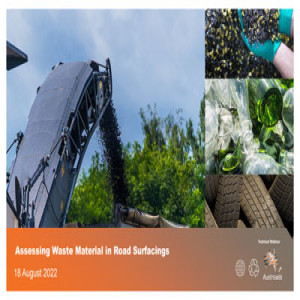
Thursday Aug 18, 2022
Assessing Waste Material in Road Surfacings
Thursday Aug 18, 2022
Thursday Aug 18, 2022
Governments, transport agencies, and industry have identified the need to reduce waste going to landfill and increase the use of recycled materials to achieve more sustainable development and improve outcomes for communities. The latest update to the Guide to Pavement Technology Part 4E: Recycled Materials covers the advancement in material re-use that has occurred in the 13 years since the 2009 version of the guide was published.
There is wide concern around the misuse of recycled materials in road construction, and it is generally agreed that roads should not be viewed as alternative avenues for waste disposal. A protocol has been established that follows a step-by-step process for quantifying the effect of using novel, post-consumer and industrial wastes or recycled materials in asphalt pavements and sprayed seal surfacings.
This webinar covers the following key updates made to the Austroads Guide to Pavement Technology Part 4E: Recycled Materials:
- Latest and emerging recycled materials utilised within pavements and information on their use in specific applications as well as associated issues, risks, and considerations.
- The developed holistic assessment framework for the use of recycled materials in road pavements.
- The developed protocol for asphalt and sprayed seals that establishes a step-by-step process for quantifying the effect of using novel, post-consumer and industrial wastes or recycled materials.
The webinar is presented by Phil Herrington from WSP New Zealand, Brody Clark from WSP Australia with participation of Grant Bosma from Waka Kotahi NZ Transport Agency and Mike Pickering from the Queensland Department of Transport and Main Roads.
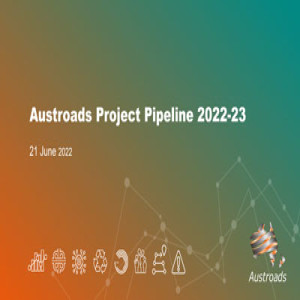
Tuesday Jun 21, 2022
Austroads Project Pipeline 2022-23
Tuesday Jun 21, 2022
Tuesday Jun 21, 2022
This webinar introduces Austroads new projects lined up for the 2022-23 financial year.
The session is most beneficial to consultants who may be interested in tendering for Austroads projects.
Upcoming projects focus on road network resilience, pavement design, movement and place, cycling and micromobility, future freight vehicles, road design, driver licensing, climate change risk assessment, automated and electric vehicle data exchange and provision.
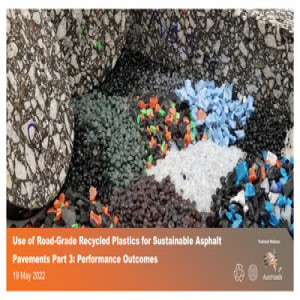
Thursday May 19, 2022
Thursday May 19, 2022
Austroads Project APT6305 Use of Road-grade Recycled Plastics for Sustainable Asphalt Pavements is investigating the use of recycled plastics in asphalt. The project is almost completed with results to date provided in three published reports.
The first report examined the use of road-grade recycled plastics in asphalt pavements and investigated the most suitable types of recycled plastics for incorporation into asphalt.
The second report provided a comprehensive overview of the development of various testing frameworks for the characterisation of road-grade recycled plastic, the incorporation of recycled plastics in bitumen and asphalt and the study of possible emissions and microplastics release.
The third report, the most comprehensive so far, presents the results of the experimental investigation on recycled plastics in asphalt and bitumen by focusing on the asphalt and bitumen properties, microplastics and emissions.
This webinar presents the outcomes of the project to date and covers the results of the multi-faceted (i.e. performance and environmental testing) laboratory investigation on bitumen and asphalt modified with recycled plastics. The session provides details on a potential framework for introducing the use of recycled plastics into current policies and specifications.
Webinar presenters are Andrew Papacostas from Department of Transport Victoria, Associate Professor Filippo Giustozzi from RMIT University and his team, including Dr Marie Enfrin, Yeong Jia Boom, and Dr Dai Lu Xuan.
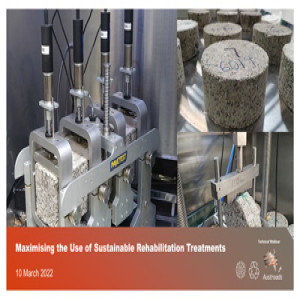
Thursday Mar 10, 2022
Maximising the Use of Sustainable Rehabilitation Treatments
Thursday Mar 10, 2022
Thursday Mar 10, 2022
This webinar, presented by Dr Negin Zhalehjoo, Andrew Papacostas and Dr Didier Bodin, focuses on the outcomes of an Austroads research project “Laboratory Fatigue Characterisation of Foamed Bitumen Stabilised (FBS) Materials”. The objective of this project was to develop a laboratory fatigue relationship to predict the performance of FBS materials to be used for future pavement design of FBS materials. Extensive laboratory experiments were undertaken during the project, including indirect tensile testing and flexural testing on laboratory prepared and cured FBS specimens.
The webinar covers the following key topics:
- A summary of the testing program and procedures to measure and analyse the fatigue life of FBS specimens.
- The results of indirect tensile testing and flexural testing to determine the modulus, strength, and fatigue characteristics of FBS materials.
- The development of a new laboratory fatigue relationship for FBS materials as well as the discussion on the potential link between the fatigue performance of the FBS mixes and the mix properties.
- The comparison between the fatigue life predictions from the Shell asphalt laboratory fatigue relationship against the predictions using the developed presumptive fatigue relationship in this project.
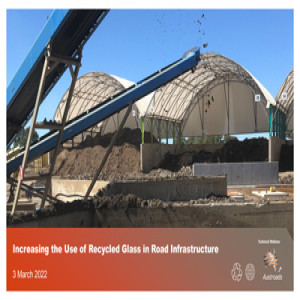
Thursday Mar 03, 2022
Increasing the Use of Recycled Glass in Road Infrastructure
Thursday Mar 03, 2022
Thursday Mar 03, 2022
This webinar, presented by Dr James Grenfell and Dr Didier Bodin, focuses on the development of a specification on the supply of recycled crushed glass sand as part of a project to support increased use of recycled crushed glass (RCG) in road infrastructure. The project covers the use of RCG as a backfill and bedding sand, and within drainage, embankment fill, landscaping, and low risk concrete applications.
The webinar covers the technical basis behind the specification development and discusses the guidelines on how to process RCG.
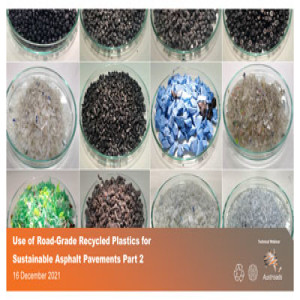
Thursday Dec 16, 2021
Use of Road-grade Recycled Plastics for Sustainable Asphalt Pavements Part 2
Thursday Dec 16, 2021
Thursday Dec 16, 2021
Austroads project “Use of Road-grade Recycled Plastics for Sustainable Asphalt Pavements” is investigating the use of recycled plastics in asphalt. The project is well underway with results to date presented in two reports.
The first report examined the use of road-grade recycled plastics in asphalt pavements and investigated the most suitable types of recycled plastics for incorporation into asphalt.
The second report provided a comprehensive overview of the development of various testing frameworks for the characterisation of road-grade recycled plastic, the incorporation of recycled plastics in bitumen and asphalt and the study of possible emissions and microplastics release.
This webinar, presented by Andrew Papacostas, Dr Filippo Giustozzi, Yeong Jia and Dr Marie Enfrin, is the second session in a two-part series. It provides an overview of the outcomes of testing to date including techniques to assess emissions and microplastic release associated with the manufacture, placement and use of asphalt containing recycled plastic.

Tuesday Dec 14, 2021
Use of Road-grade Recycled Plastics for Sustainable Asphalt Pavements Part 1
Tuesday Dec 14, 2021
Tuesday Dec 14, 2021
Austroads project “Use of Road-grade Recycled Plastics for Sustainable Asphalt Pavements” is investigating the use of recycled plastics in asphalt. The project is well underway with results to date presented in two reports.
The first report examined the use of road-grade recycled plastics in asphalt pavements and investigated the most suitable types of recycled plastics for incorporation into asphalt.
The second report provided a comprehensive overview of the development of various testing frameworks for the characterisation of road-grade recycled plastic, the incorporation of recycled plastics in bitumen and asphalt and the study of possible emissions and microplastics release.
This webinar, presented by Andrew Papacostas and Dr Filippo Giustozzi, is the first session in a two-part series and it details the outcomes of the potential use of road-grade recycled plastics in asphalt pavements and selection of the most suitable types of recycled plastics for incorporation into asphalt.
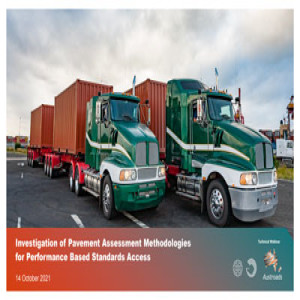
Thursday Oct 14, 2021
Investigation of Pavement Assessment Methodologies for PBS Access
Thursday Oct 14, 2021
Thursday Oct 14, 2021
We rely on road freight transport to keep Australia’s economy moving. Performance Based Standards (PBS) vehicles, that are typically longer and heavier, do this work more efficiently but how much road damage do they cause in the process?
This webinar, presented by Anthony Germanchev, Georgia O’Connor and Angus Draheim, explores the methods used by road managers to answer this question. It proposes a framework to support consistent approaches to understanding and comparing the pavement impacts of PBS vehicles. Some of the key steps government agencies are taking to support road managers in assessing PBS vehicles for network access are also outlined.
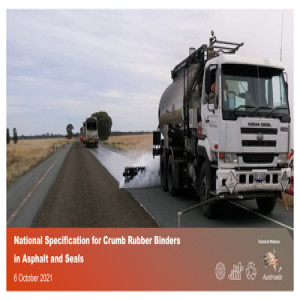
Wednesday Oct 06, 2021
National Specification for Crumb Rubber Binders in Asphalt and Seals
Wednesday Oct 06, 2021
Wednesday Oct 06, 2021
Australia and New Zealand produce about 510,000 tonnes of end‑of‑life tyres annually. Crumb rubber derived from end‑of‑life tyres has been used in Australia for several decades to enhance the performance of binders used in sprayed seals but prior to 2017 the use of crumb rubber in asphalt pavements was limited.
Due to the lack of crumb rubber binder grades suitable for use in asphalt in the Austroads national polymer modified binder (PMB) specification (ATS 3110), two Australian jurisdictions and the Australian Flexible Pavement Association recently developed specifications for crumb rubber binders for use in asphalt which were based on tests and testing protocols used in Arizona and California.
This webinar, presented by Robert Urquhart, focuses on the outcomes of an Austroads research project which investigated whether the crumb rubber binders that were trialled in asphalt could be specified in terms of the tests and testing protocols used to specify other types of PMBs in the Austroads national PMB specification. Specification requirements have also been proposed for a binder containing 9% crumb rubber by weight which could be used in sprayed sealing applications.
The webinar also discusses the results of laboratory asphalt performance tests which investigated the effects of the amount of crumb rubber in a binder on asphalt performance.
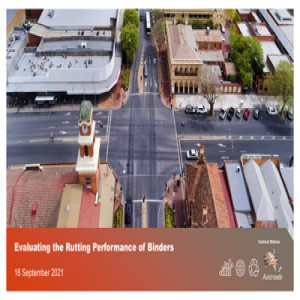
Thursday Sep 16, 2021
Evaluating the Rutting Performance of Binders
Thursday Sep 16, 2021
Thursday Sep 16, 2021
Asphalt pavements are a major component of the Australian and New Zealand road networks. Road agencies in Australia and New Zealand have been putting great efforts to produce pavements which perform and are long-lasting. This has led to the development of national specifications to ensure materials of suitable quality are used for road construction.
Austroads ATS 3110 is used as a national performance-based specification for polymer modified binders (PMBs). The specification includes the consistency 6% (at 60 °C) property to evaluate the relative performance of a binder to resist rutting, as it is one of the major failure modes of asphalt pavements.
Consistency 6% tests are currently conducted using the elastometer instrument that was developed in Australia specifically for these tests. This instrument, however, is no longer being manufactured and the supplier is no longer providing technical support for existing instruments. A new test method has therefore been developed to determine consistency 6% properties using a dynamic shear rheometer (DSR) rather than the elastometer. The DSR is widely used to test bituminous binders and other materials across the world.
Presented by Young Choi, this webinar details the outcomes of the Austroads research project which was conducted to develop the DSR consistency 6% test method. The project work included an extensive literature review, equipment investigations, optimisation of test procedures and validation studies using many different types of binders. These studies were conducted to ensure that the new DSR test method is equivalent to the current elastometer test method.

